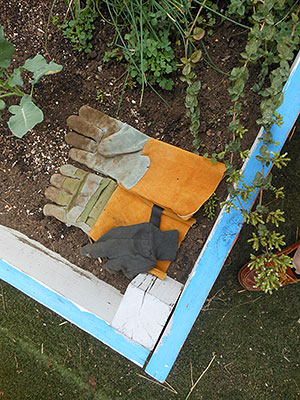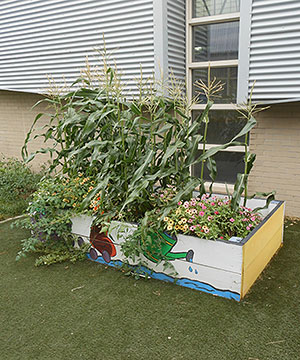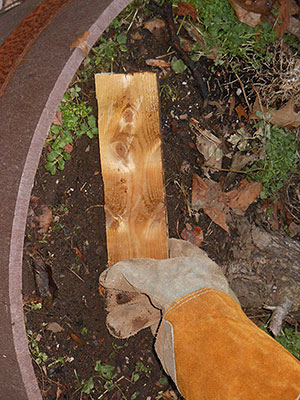Fact Sheet FS1241
Benefits of Gardening with Incarcerated Youth and Adults
Gardening can have many benefits for youth and adults in a detention facility. Growing flowers, vegetables and fruits gives individuals an opportunity to be productive. This, in turn, increases self-esteem and pride. Gardening can also help relieve stress and provides an opportunity to sample fresh produce and learn about agriculture. Participants can develop vocational interests from horticulture activities as well. Others say it will now allow them to assist others. As a youth in a detention horticulture program remarked, "Now I will be able to help my aunt with her garden."
Many detention centers welcome volunteers and outside groups into their facilities. They may be eager to add special programs, such as gardening. Contact your local corrections or human services department for more information about helping inmates.
Starting a Garden in a Detention Center
The intent of this publication is to show the different gardening techniques and materials that may be needed in a correctional facility due to safety considerations. It will provide details on topics such as selection of tools and their storage, methods of weeding and watering, soil cultivation and crop selection.
This publication does not cover the care and planting of individual plants nor site considerations since these items are covered in the Rutgers Cooperative Extension Bulletin E348, "Starting a School Garden".

Figure 1. Gauntlet type gloves (gray & yellow) with regular size brown garden glove.
Special Considerations for Gardening in a Detention Center
Storage of equipment - When not in use, garden hoses, watering cans and any other tools may need to be secured as they can be used as weapons, means of escape, or to self-harm. They can be locked in a closet or in a secure bin.
Working with the soil – Some correctional facilities do not allow the inmates to use metal or plastic shovels. Thus turning the soil over and adding fertilizer or other amendments can be difficult. However, a safe, simple substitute exists: using hands. Hands are excellent for digging if you wear thick leather gloves to protect them. The leather protects your fingers and palms from scraping or bruising. It also protects from harmful insects, stray glass and other sharp objects. In addition, this method provides excellent upper body exercise which can be a means of reducing stress.
Hand digging, however, can be difficult if the garden is not in raised beds. It may require a great deal of bending. Also, hand digging is difficult in areas that have not been cultivated previously or in compacted soils. In these situations the soil will have to be loosened with a tool or machine beforehand in order to assure that digging is feasible.
Gloves for Digging - Using thick leather gloves with a long sleeve attached to it will keep the soil from getting into the gloves (see Photo #1). These types of gloves are often referred to as gauntlet-type gloves. Some gardeners use them for pruning thorny plants and some welders use them as well. Whatever type is chosen it is only important that the glove part is composed of thick leather. The back of the hand and the gauntlet can be of lighter-weight material.

Figure 2. Raised bed.
Weeding the Garden - Large weeds, over three inches tall, are hand pulled from the garden. Having the garden growing in a raised bed, that is 18" to 24" tall, will eliminate the need for bending (see Photo #2). When the weeds are more plentiful but small (under two inches in height), we would like to use a hoe to scrape the soil surface but this tool may not be permitted. Instead, small pieces of lumber such as a four-inch piece of one inch by two inch works well to scrape the surface of the soil (see Photo #3). Scraping small weeds from the surface of the garden is much quicker than hand pulling larger ones.
Harvesting and Processing - Unlike other settings you may not be able to use tools or appliances to peel, cook or cut harvested produce. In lieu of this equipment, plants that do not need tools or cooking prior to consumption can be grown. Some examples are: grape tomatoes, sugar snap peas, strawberries, blueberries, cucumbers, sweet red peppers, sweet corn and carrots. If possible, use varieties that have extended harvest periods. For example, everbearing or day-neutral strawberries bear fruit for three months versus June-bearing strawberries which only produce fruit for one month.
Trellising or Staking Plants - Some facilities will not allow tomato cages, stakes or trellising materials. Others will allow these materials only if they are secured to the side of the raised bed with screws or bolts. If you cannot use these materials, consider growing dwarf or pot- size varieties of plants. These do not need staking, trellising or caging. They can also be planted close to the side of the raised bed so they can cascade down the side of it.
Pest Control and Crop Failure - The precautions necessary to use pesticides around inmates may be difficult to implement. In such situations, consider the use of row- covers, hand picking of insects and wiping the leaves by hand. These simple techniques can control many insect problems. To avoid disease problems, rotate crops and use resistant varieties whenever possible. Despite these precautions, some plants may fail to produce. An obvious alternative is to replace the harvest with external produce. Beneficial predators like ladybugs may be used for pest control.

Figure 3. Using wood to weed.
Safety at the Facility - When working with the residents, at least two adults should be present at all times. Besides the horticulture instructor/volunteer the other adult should be a corrections professional. One instructor per three students is a sufficient ratio. As students become more experienced, the ratio can be increased.
Also, the garden should be inspected for poisonous items and loose parts before the residents are allowed into it. While poisonous plants/fungus are not intentionally planted, their seeds or spores may be carried into the garden by wind, birds or be present in purchased soil. Look the garden over closely and remove these if present. Also, hardware holding the raised bed together may become loose, causing it to be easily removed from the garden.
Working with the Residents
It has often been said to teachers that, "Your students don't care what you know until they know that you care." Garden volunteers and instructors can show that they care about the residents by making the gardening experience as comfortable and enjoyable as possible. The following is a list of suggestions to make this possible:
- Be prepared! Have the tools and supplies needed before meeting with the residents.
- Be encouraging and empowering, but do not do the work for them.
- Be positive and hopeful, should failure occur, turn it into a learning experience.
- Be respectful – don't ask residents about their personal lives or the incidents that have led to their incarceration.
- Be private – share information about gardening with the residents but not about your personal life.
- Don't worry about maximizing yields but rather ensure that each student gets to experience planting, watering, harvesting and other garden activities.
- Lastly, consider a refreshment time at each garden session. This can be produce from the garden or purchased snacks such as fresh fruit or crackers. Check all snacks with administrators of facility before serving.
Resources
Notes on the Author
James Nichnadowicz is a Rutgers Cooperative Extension 4-H Agent in Union County, N.J. This fact sheet is based on his gardening experience with youth at the Union County New Jersey, Juvenile Detention Center from 2009 to 2014.
Notes on the Reviewers
Joel Flagler is a certified Horticultural Therapist, Professor at Rutgers School of Environmental and Biological Sciences and Agricultural Resource Management Agent at Rutgers Cooperative Extension of Bergen County. He has developed horticulture therapy programs for the Bergen County Jail as well as for youth detention centers throughout New Jersey through the Rutgers-NJDOC "Careers in the Green Industry" program.
Charles Gromer is an educator with the New Jersey Division of Juvenile Justice. He has run horticulture programs in correctional facilities for over 25 years.
March 2015
Copyright © 2024 Rutgers, The State University of New Jersey. All rights reserved.
For more information: njaes.rutgers.edu.
Cooperating Agencies: Rutgers, The State University of New Jersey, U.S. Department of Agriculture, and Boards of County Commissioners. Rutgers Cooperative Extension, a unit of the Rutgers New Jersey Agricultural Experiment Station, is an equal opportunity program provider and employer.

